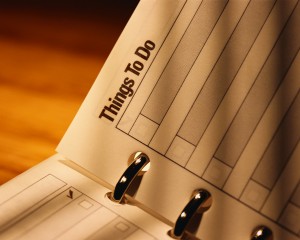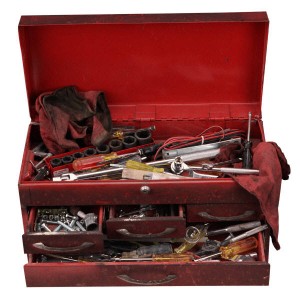
Even I was a bit skeptical at that headline and I wrote it! However, it is true I promise! The one thing I’ll tell you about is really simple too. It has to do with assigning priorities in your to-do list.
I recently switched over to an online to-do list manager called Remember The Milk. One of the many great features is that you can assign priorities to your to-do items with choices of 1,2,3 or none (priority 1 shows on top of your list). I hadn’t been using priorities in my two most recent systems and didn’t want to get too complicated so I stuck with just using priority 1 or no priority. My rule for deciding whether to prioritize something was either it had a fixed deadline with a high penalty for missing (e.g. paying a bill or sending my newsletter) or it was just something important to me (sweeping up the dog hair from the floors). What started to happen was that in my two levels of priority, many things got put in priority 1. So many items were in priority 1 that I began to fall behind and had to start triaging even my high-priority items. This is where stress comes in – it’s very stressful to look at a big list of priority 1 items, know you can’t get to all of them and have to start deciding which to do and which to leave undone for now. It’s also a big waste to spend time and energy deciding what to do because you haven’t maintained your to-do lists in a way that supports you getting things done.
What I did, and this is the big secret today, is to change my criteria for priority 1 into only things that carry a substantial penalty for not being done on time. To support this, I added a middle layer of priority for things that don’t have to be done by a specific day but I that I don’t want to leave indefinitely either. Sweeping up the dog hair falls in here – it doesn’t have to be done today, but I can’t let it go for too long and maintain a sanitary living space. In contrast, sending my newsletter is a priority 1 because it reflects badly on me and disappoints people who have placed trust in me to send it late. The big temptation is to load too many things into priority 1, which takes me back to the original problem. It’s been helpful to have a rule to determine if something really belongs in priority 1.
The big stress relief comes from looking at my to-do list and seeing just 2-5 items that are priority 1 for today. It’s a small universe, it feels do-able, and lets me know in a glance what has to be done today. Everything else is optional. Having things laid out this way is great for really busy days – I can crank through the “must do’s” and even there’s dozens of things that don’t get done I know without a second glance I’ve done what has to be done today.
You can apply this with almost any system you use. Every electronic to-do list manager I’ve ever used allows you to assign priorities and you could even do this with paper so I encourage you to give it a try. It’s done wonders for me, and less stress equals more and better quality work.
Do you have any to-do list tricks you use? Tell me about them in the comments.




